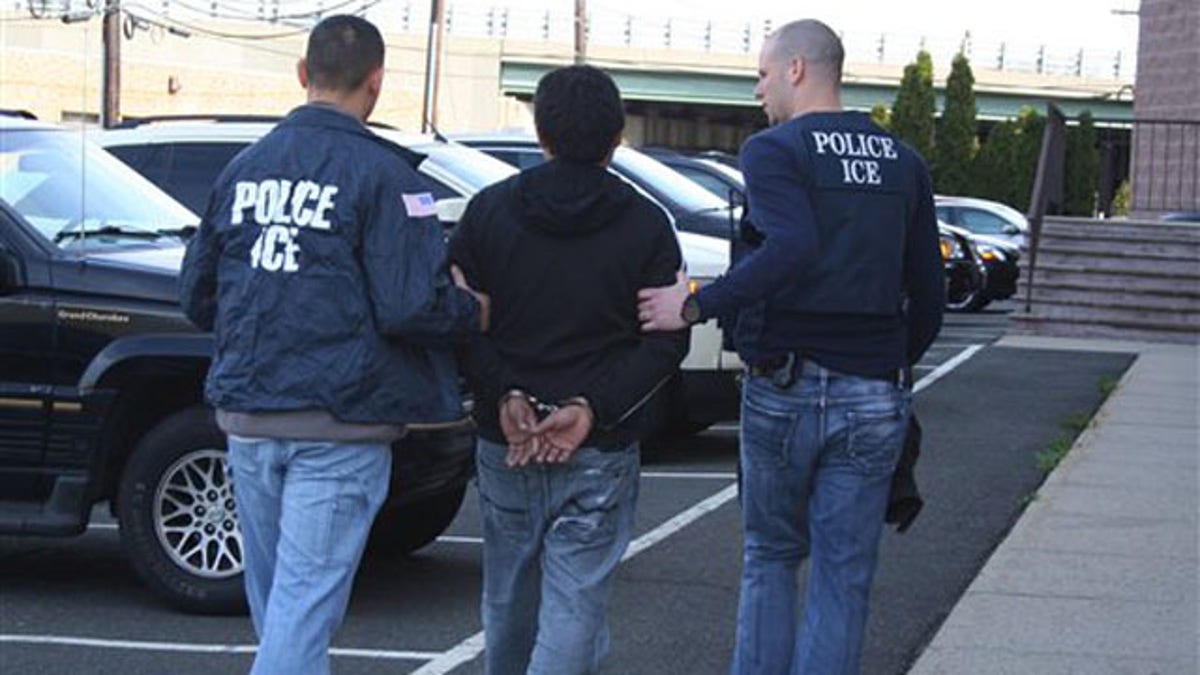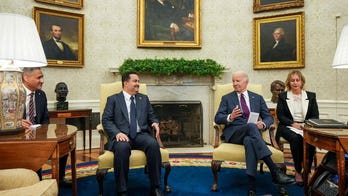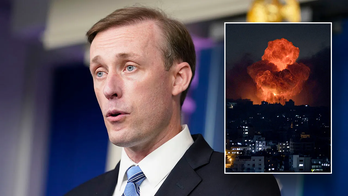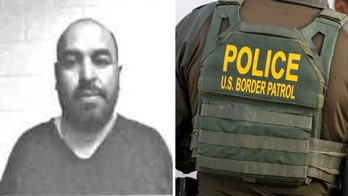
This photo provided by the U.S. Immigration and Customs Enforcement, Wednesday, March 28, 2012, in New Jersey, shows agents taking a person into custody during operation Cross Check III. The Obama administration said it arrested more than 3,100 immigrants who were illegally in the country and who were convicted of serious crimes or otherwise considered fugitives or threats to national security. It was part of a six-day nationwide sweep that the government described as the largest of its kind. (AP Photo/U.S. Immigration and Customs Enforcement) (ICE)
Washington, D.C. – In the last fiscal year the Obama administration spent more money on immigration enforcement than it budgeted for the FBI, the Bureau of Alcohol, Tobacco, Firearms and Explosives, the Drug Enforcement Administration and the U.S. Secret Service, according to a new report released on Monday.
The report, from the Migration Policy Institute, a non-partisan Washington D.C.-based group focused on global immigration issues, said that in the 2012 budget year that ended in September the government spent about $18 billion on immigration enforcement programs run by Immigration and Customs Enforcement, the U.S.-Visit program, and Customs and Border Protection, which includes the Border Patrol.
Since President Reagan signed the Immigration Reform and Control Act in 1986 –which legalized more than 3 million illegal immigrants and overhauled immigration laws– the government has spent more than $187 billion on immigration enforcement. According to the report, "Immigration Enforcement in the United States: The Rise of a Formidable Machinery," federal immigration-related criminal prosecutions also outnumber cases generated by the Justice Department.
The 182-page report concludes that the Obama administration has made immigration its highest law enforcement priority.
"Today, immigration enforcement can be seen as the federal government's highest criminal law enforcement priority, judged on the basis of budget allocations, enforcement actions and case volumes," MPI Senior Fellow Doris Meissner, a co-author of the report, said in a statement released with the report Monday.
Proponents of more lenient immigration policies assailed the heavy emphasis on enforcement.
"Congress has been a one-trick pony: enforcement first and enforcement only," said Frank Sharry, head of America's Voice, which advocates for an immigration reform that would include a path to legalization for undocumented immigrants. "But we can’t enforce our way to a sensible, modernized immigration system."
"Congress has to enact broad legislation that combines targeted enforcement with a road to citizenship for those here without papers and a flexible and functional legal immigration system," Sharry said to Fox News Latino. "It’s time to stop ripping families apart and wasting taxpayer dollars and time to pass comprehensive immigration reform."
Those who favor stricter immigration enforcement questioned the report's portrayal of the Obama administration as more aggressive on cracking down on illegal immigration.
Jack Martin, spokesman for the Federation for American Immigration Reform, or FAIR, which favors strict immigration policies, said that it is misleading simply to dwell on the figures presented in the report.
The findings, Martin said, "distract people from the fact that our border is not secure yet, from the fact that there is no security for American workers in terms of the U.S. job market and protection from illegal workers, and from the fact that the Obama administration has systematically dismantled interior enforcement against illegal aliens who have taken U.S. jobs."
The report by MPI's Meissner, Muzaffar Chishti, Donald Kerwin and Clair Bergeron, comes amid renewed interest in immigration reform from Congress and the White House.
In the immediate aftermath of the November election, congressional Republicans suggested the time was right to begin reform talks anew. President Barack Obama, who won a record share –71 percent– of Hispanic voters, renewed a previous pledge to make immigration reform a priority.
In the lead up to the election, Obama made several administrative changes to the immigration system, including launching a program to allow some young illegal immigrants to avoid deportation and work legally in the country for up to two years.
His administration also refocused enforcement efforts to target criminal immigrants and those who posed a security threat.
And just last week, the administration announced a rule change to allow some illegal immigrant spouses and children of U.S. citizens to stay in the country while they ask the government to waive 3- or 10-year bans on returning to the United States. Immigrants who get the waiver will still need to leave the country to complete visa paperwork, but will be able to leave without fear of being barred from returning to their families for up to a decade. The rule, first proposed last year, goes into effect in March.
Republican lawmakers have widely criticized the policy changes, routinely describing them as "backdoor amnesty." Many of those same lawmakers have said the border needs to be secured before reform can be taken up.
According to the MPI report and Border Patrol statistics, in 2011 agents arrested about 327,000 people at the southern border, the fewest in nearly 40 years. The Homeland Security Department also removed a record 396,906 immigrants that year. In 2012, nearly 410,000 people were removed from the United States.
Obama campaigned in 2008 on the promise that he would fight for comprehensive immigration reform, which would include tighter enforcement but also a pathway to legalization for millions of undocumented immigrants. But many Latinos and immigration advocacy groups said Obama did not push for reform enough, and instead presided over aggressive enforcement, including record deportation rates.
"With shrinking budgets and increasingly rampant civil rights violations in the name of 'immigration enforcement', today's study is a wake up call to our legislators," said Jessica Karp, an attorney with National Day Laborer Organizing Network, about the Migration Policy Institute report. "That the U.S. spent almost $18 billion last year to detain immigrants and separate families for violating immigration laws that are widely recognized as outdated and impractical shows just how far anti-immigrant fervor has gone in spawning backwards priorities in Congress."
This story includes material from The Associated Press.
Follow us on twitter.com/foxnewslatino
Like us at facebook.com/foxnewslatino




